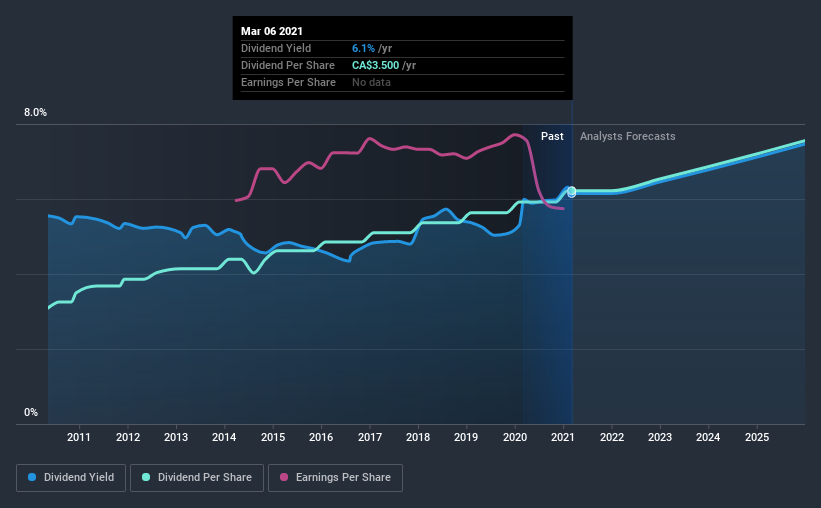Dividend Investors: Don't Be Too Quick To Buy BCE Inc. (TSE:BCE) For Its Upcoming Dividend
BCE Inc. (TSE:BCE) is about to trade ex-dividend in the next four days. You will need to purchase shares before the 12th of March to receive the dividend, which will be paid on the 15th of April.
BCE's upcoming dividend is CA$0.88 a share, following on from the last 12 months, when the company distributed a total of CA$3.50 per share to shareholders. Looking at the last 12 months of distributions, BCE has a trailing yield of approximately 6.1% on its current stock price of CA$56.93. Dividends are an important source of income to many shareholders, but the health of the business is crucial to maintaining those dividends. As a result, readers should always check whether BCE has been able to grow its dividends, or if the dividend might be cut.
Check out our latest analysis for BCE
Dividends are typically paid out of company income, so if a company pays out more than it earned, its dividend is usually at a higher risk of being cut. BCE distributed an unsustainably high 133% of its profit as dividends to shareholders last year. Without more sustainable payment behaviour, the dividend looks precarious. A useful secondary check can be to evaluate whether BCE generated enough free cash flow to afford its dividend. Over the last year, it paid out more than three-quarters (90%) of its free cash flow generated, which is fairly high and may be starting to limit reinvestment in the business.
It's good to see that while BCE's dividends were not covered by profits, at least they are affordable from a cash perspective. Still, if the company repeatedly paid a dividend greater than its profits, we'd be concerned. Extraordinarily few companies are capable of persistently paying a dividend that is greater than their profits.
Click here to see the company's payout ratio, plus analyst estimates of its future dividends.
Have Earnings And Dividends Been Growing?
Companies with falling earnings are riskier for dividend shareholders. If earnings decline and the company is forced to cut its dividend, investors could watch the value of their investment go up in smoke. That's why it's not ideal to see BCE's earnings per share have been shrinking at 3.4% a year over the previous five years.
The main way most investors will assess a company's dividend prospects is by checking the historical rate of dividend growth. Since the start of our data, 10 years ago, BCE has lifted its dividend by approximately 7.2% a year on average. That's intriguing, but the combination of growing dividends despite declining earnings can typically only be achieved by paying out a larger percentage of profits. BCE is already paying out a high percentage of its income, so without earnings growth, we're doubtful of whether this dividend will grow much in the future.
Final Takeaway
Should investors buy BCE for the upcoming dividend? It's never fun to see a company's earnings per share in retreat. Additionally, BCE is paying out quite a high percentage of its earnings, and more than half its cash flow, so it's hard to evaluate whether the company is reinvesting enough in its business to improve its situation. With the way things are shaping up from a dividend perspective, we'd be inclined to steer clear of BCE.
With that being said, if you're still considering BCE as an investment, you'll find it beneficial to know what risks this stock is facing. Our analysis shows 2 warning signs for BCE that we strongly recommend you have a look at before investing in the company.
A common investment mistake is buying the first interesting stock you see. Here you can find a list of promising dividend stocks with a greater than 2% yield and an upcoming dividend.
This article by Simply Wall St is general in nature. It does not constitute a recommendation to buy or sell any stock, and does not take account of your objectives, or your financial situation. We aim to bring you long-term focused analysis driven by fundamental data. Note that our analysis may not factor in the latest price-sensitive company announcements or qualitative material. Simply Wall St has no position in any stocks mentioned.
Have feedback on this article? Concerned about the content? Get in touch with us directly. Alternatively, email editorial-team (at) simplywallst.com.



